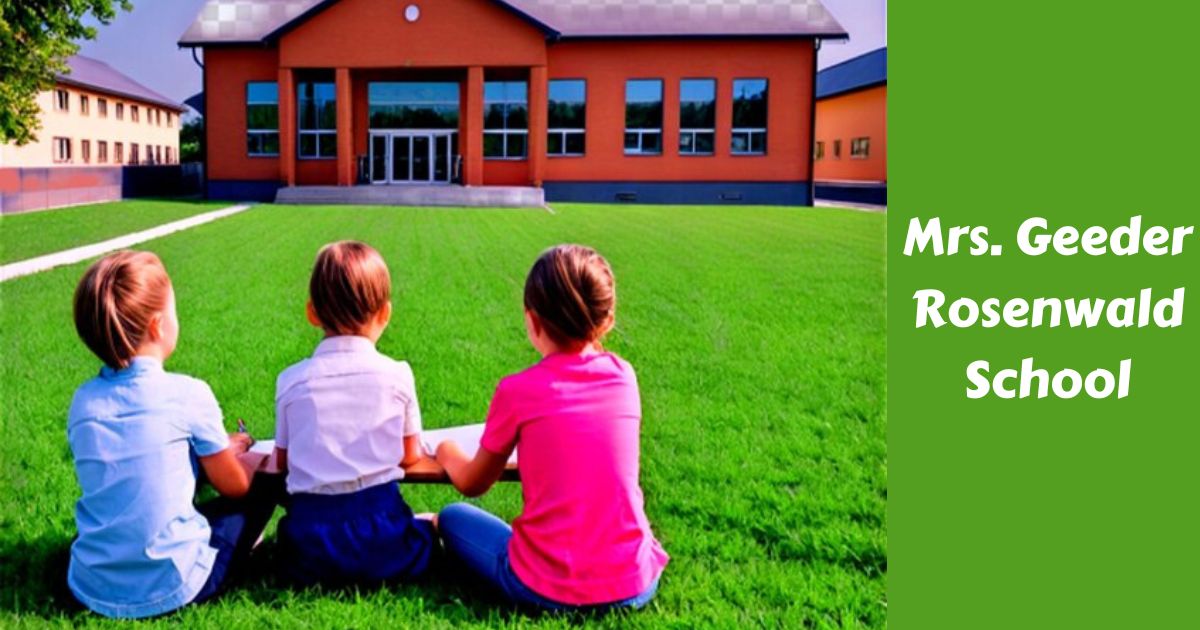The history of education in the United States is filled with stories of resilience, innovation, and progress, and one of the most impactful legacies lies within the Rosenwald Schools. Among these schools is Mrs. Geeder Rosenwald School, a testament to the strides made toward educational equity in the early 20th century. This school represents not only an important chapter in African American education but also highlights the role of community-driven efforts to overcome systemic challenges. Through this article, we will delve into the rich history, impact, and legacy of Mrs. Geeder Rosenwald School, shedding light on its significance in the broader context of educational reform.
The Origins of Rosenwald Schools
Rosenwald Schools were established as part of a partnership between Julius Rosenwald, a philanthropist and president of Sears, Roebuck and Company, and Booker T. Washington, a prominent African American educator. In the early 1900s, the disparity in educational opportunities for African American children was stark, especially in the rural South. Washington’s vision of providing quality education to African American communities aligned with Rosenwald’s philanthropic goals. Together, they created the Rosenwald Fund, which helped build thousands of schools, known as Rosenwald Schools, across the South.
The Purpose and Mission of Mrs. Geeder Rosenwald School
Mrs. Geeder Rosenwald School, like other Rosenwald Schools, was founded with a mission to provide quality education to African American children who were often denied access to well-resourced public schools. These schools were meant to be more than just places of learning; they were safe havens where children could cultivate knowledge, community, and pride. The mission extended beyond academics, as it aimed to empower students to become contributors to society.
The Community Role in Establishing the School
One unique aspect of the Rosenwald Schools was the requirement for community involvement. Community members, often with limited resources, were asked to contribute money, labor, or materials to construct the schools. In the case of Mrs. Geeder Rosenwald School, the local African American community rallied together to raise funds, gather materials, and physically build the school. This collective effort fostered a deep sense of pride and ownership among the community members, who saw the school as a beacon of hope for future generations.
The Architectural Design of Mrs. Geeder Rosenwald School
Rosenwald Schools, including Mrs. Geeder Rosenwald School, were designed with simplicity and functionality in mind. The Rosenwald Fund provided standardized architectural plans that emphasized natural light, ventilation, and efficient use of space. Mrs. Geeder Rosenwald School’s architecture reflected these principles, with large windows, high ceilings, and multipurpose rooms. The school’s layout was conducive to a positive learning environment, which was crucial for student success in an era when resources were scarce.
Educational Curriculum and Activities at Mrs. Geeder Rosenwald School
The curriculum at Mrs. Geeder Rosenwald School was broad, encompassing core subjects such as reading, writing, and arithmetic, along with vocational training and practical skills. The school sought to provide students with a well-rounded education, preparing them for both academic pursuits and practical vocations. Beyond academics, students were encouraged to participate in activities that fostered creativity, critical thinking, and leadership skills. This approach was instrumental in helping students develop into well-rounded individuals equipped to navigate the challenges of their time.
The Impact on African American Education
Mrs. Geeder Rosenwald School had a profound impact on African American education within the community. It provided a stable environment where children could learn and grow, free from the discriminatory practices that plagued public schools. By equipping students with knowledge and skills, the school empowered them to pursue higher education, skilled professions, and leadership roles. This empowerment extended beyond individual students to the entire African American community, as educated individuals became advocates for social justice and economic progress.
Challenges Faced by Mrs. Geeder Rosenwald School
Despite its success, Mrs. Geeder Rosenwald School faced numerous challenges. Funding was always a concern, as the school relied on limited resources from both the Rosenwald Fund and the community. Teachers, often underpaid and overworked, dedicated themselves to their students despite lacking basic supplies and support. Additionally, the political climate of the time posed significant obstacles, as segregation laws and discriminatory policies made it difficult for African American schools to thrive. Nevertheless, the school’s resilience in the face of these challenges is a testament to the dedication of its staff, students, and supporters.
The Legacy of Mrs. Geeder Rosenwald School
The legacy of Mrs. Geeder Rosenwald School is enduring, as it represents a chapter in American history marked by resilience and determination. Although many Rosenwald Schools closed after the desegregation of public schools, the impact of these institutions remains. Former students of Mrs. Geeder Rosenwald School went on to become community leaders, educators, and advocates, carrying forward the values instilled in them during their formative years. The school’s legacy also lives on in the preservation of educational equity as a fundamental goal.
The Preservation of Rosenwald Schools and Historical Recognition
Today, efforts are being made to preserve surviving Rosenwald Schools as historical landmarks. Organizations, historians, and community groups work tirelessly to restore these buildings, recognizing their cultural and educational significance. Mrs. Geeder Rosenwald School stands as a symbol of progress, and preserving its structure allows future generations to understand and appreciate the struggles and triumphs of those who came before them.
The Influence of Mrs. Geeder Rosenwald School on Modern Education
The influence of Mrs. Geeder Rosenwald School can still be seen in modern educational philosophies that prioritize community involvement, equitable access, and holistic student development. By examining the model of Rosenwald Schools, modern educators gain insight into the importance of inclusive and accessible education. Mrs. Geeder Rosenwald School serves as a reminder that education is a community endeavor and that every child deserves the opportunity to succeed.
Remembering the Teachers and Staff of Mrs. Geeder Rosenwald School
The teachers and staff at Mrs. Geeder Rosenwald School were instrumental in shaping the lives of countless students. Many educators worked tirelessly with limited resources, driven by their commitment to providing a quality education. Their dedication, compassion, and resilience left a lasting impression on students and contributed to the school’s success. Remembering these individuals is essential to honoring the legacy of the school and acknowledging the profound impact they had on their community.
Mrs. Geeder Rosenwald School and the Civil Rights Movement
The educational foundation laid by Mrs. Geeder Rosenwald School played a crucial role in the Civil Rights Movement. Educated individuals from Rosenwald Schools became active participants in the fight for equality, using their knowledge and skills to challenge segregation and discrimination. The school’s influence extended beyond its walls, contributing to a generation of leaders who championed social justice and civil rights.
The Importance of Community in the School’s Success
The success of Mrs. Geeder Rosenwald School was, in large part, due to the strong sense of community surrounding it. Families, students, teachers, and local leaders all played a role in supporting the school’s mission. This unity and collective effort created a nurturing environment that was essential to the school’s positive impact. Today, Mrs. Geeder Rosenwald School serves as a model of how community involvement can uplift educational institutions.
How Mrs. Geeder Rosenwald School Shaped Future Generations
The students of Mrs. Geeder Rosenwald School carried forward the lessons and values they learned, passing them on to future generations. By instilling a commitment to education, perseverance, and community engagement, the school influenced countless families and inspired a lasting commitment to educational progress. The school’s legacy continues to inspire educational initiatives that focus on inclusivity and equal opportunities.
Conclusion
Mrs. Geeder Rosenwald School stands as a remarkable example of how education can be a tool for empowerment and social change. Its legacy lives on in the countless individuals whose lives were touched by the school’s commitment to educational equity. As a part of the Rosenwald School network, it played a pivotal role in bridging the educational gap for African American communities in the South. The story of Mrs. Geeder Rosenwald School serves as a reminder of the power of community, resilience, and the enduring impact of education on society.
FAQs
What was the purpose of Mrs. Geeder Rosenwald School?
The purpose of Mrs. Geeder Rosenwald School was to provide quality education to African American children during a time of educational inequality and to foster a sense of community empowerment.
Who funded Rosenwald Schools like Mrs. Geeder Rosenwald School?
The Rosenwald Schools were funded by philanthropist Julius Rosenwald in collaboration with Booker T. Washington, as well as contributions from local communities.
How did Mrs. Geeder Rosenwald School impact the Civil Rights Movement?
The school educated students who later became advocates and leaders in the Civil Rights Movement, contributing to the push for social justice and equality.
Why is Mrs. Geeder Rosenwald School significant today?
The school is significant because it represents the resilience of communities striving for educational equity and serves as a historical reminder of the importance of accessible education.








